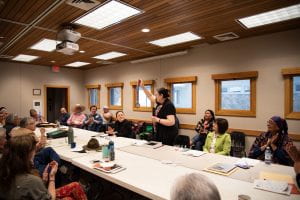
2024 TAAP Awardees; Clockwise from top left-hand corner: Gayle Oram, Patti Jo Meshnik, Tetyana Horner, Tetyana Zelyanovska, Jennifer O’Dell, Jason Villa, Arturo Zavala, Prekshita Jain, Jayanthi Raman, Beth’Ann Gipson.
Five traditional artists in Oregon will receive a $3,500 stipend to teach traditional art forms to apprentices from their same cultural communities, Tribes, sacred, or occupational groups. The Traditional Arts Apprenticeship Program (TAAP) is one way the Oregon Folklife Network supports traditional artists, or Culture Keepers, in Oregon. The stipend supports mentor artists in sharing their knowledge, skills, and expertise with apprentices of great promise who will be empowered to carry on and strengthen Oregon’s living cultural traditions.
A state-level honor of great prestige, TAAP awards are often a precursor for traditional artists to be nominated for the National Endowment for the Arts National Heritage Fellowship award. Funding for TAAP comes from the Oregon Arts Commission and the National Endowment for the Arts. Applications are accepted annually until October for funding in the following calendar year.
The artists to receive awards are:
Beth’Ann Gipson with Jennifer O’Dell – Cow Creek Band of Umpqua Tribe of Indians Basket Weaving
Beth’Ann Gipson is a basketmaker, drummer, traditional regalia maker, and member of the Cow Creek Band of Umpqua Tribe of Indians. Gipson is heavily involved in revitalization efforts for her Tribe, from drumming and singing to powwows to dance. Gipson is proud to be carrying on basketmaking traditions that are gradually making their way back into her community. Gipson’s apprentice, Jennifer O’Dell, is also a member of the Cow Creek Band of Umpqua Tribe of Indians. She is honored to accept this apprenticeship position and is very excited to start a new basket. She is a hard worker, proud Culture Keeper, and has learned the art of patience when it comes to weaving basketry. She hopes that she will teach alongside Beth’Ann Gipson in the future.
Gipson and O’Dell’s artist profiles and samples of their work can be found at: https://mnch.uoregon.edu/bethann-gipson
Tetyana Horner with Tetyana Zelyanovska – Ukranian Weaving
Tetyana Horner was born in the former Soviet Union and grew up in post-Soviet Ukraine. In 2013, Horner sought out weaving classes at the Multnomah Arts Center. From there, she continued to learn, practice, source instructional books, and practice some more. Horner is slowly building her home studio so that she can begin teaching Ukrainian weaving to a more intimate audience. Horner’s apprentice, Tetyana Zelyanovska, lived in Ukraine until just four years ago. Since moving, she has tried to keep Ukrainian traditions alive in her family. She was given a tapestry loom by a neighbor and taught herself some basics of tapestry weaving. She likes to make things by hand and has passion to continue to learn traditional Ukrainian weaving on a horizontal loom.
Horner and Zelyanovska’s artist profiles and samples of their work can be found at: https://mnch.uoregon.edu/tetyana-horner
Gayle Oram with Patti Jo Meshnik – Norwegian Rosemåling
Gayle Oram’s Norwegian Rosemåling painting career spans more than thirty years. Oram first encountered Rosemåling in 1977 in Petersburg, Alaska (a Norwegian fishing settlement with Rosemåling painted on the store fronts). Over the years, Gayle has conducted seminars, local classes, and has published eight books about Rosemåling. Oram’s apprentice, Patti Jo Meshnik, was first introduced to Rosemåling in June of 1980 in Montana. Her mother, the daughter of Norwegian emigrants, invited her to take a class with her. She had no idea at the time that Rosemåling would become such an important part of her story. Meshnik is eager to deepen her skills as a Rosemåler in efforts to preserve her Norwegian heritage. After this apprenticeship, she will continue the tradition by teaching Rosemåling classes.
Oram and Meshnik’s artist profiles and samples of their work can be found at: https://mnch.uoregon.edu/gayle-oram
Jayanthi Raman with Prekshita Jain – Nattuvangam, Rhythmic Structure of Bharatha Natyam Classical Indian Dance
Jayanthi Raman is an acclaimed performer, choreographer, and master teacher of the classical Indian dance form Bharatha Natyam for over the past four decades. She is a reputed scholar of her art form and an acclaimed nattuvangar (orchestra conductor of the live orchestra accompanying a dance recital). She has performed and toured in US and internationally, reaching wide audiences, some of who had never seen this genre of art. Raman’s apprentice, Prekshita Jain, was born in the culturally rich city, Bangalore, South India. Being from a traditional South Indian family, Jain was exposed to a lot of classical music and dance forms early in childhood. Growing up in musical family, Jain has a natural instinct for rhythm. However, the beat cycles in Bharatha Natyam are unique, complex, and require training to understand.
Raman and Jain’s artist profiles and samples of their work can be found at: https://mnch.uoregon.edu/jayanthi-raman-0
Arturo Zavala with Jason Villa – Mariachi Trumpet and Musicianship
Arturo Zavala is an acclaimed Eugene-based mariachi trumpet player. Zavala is a second-generation mariachi musician – his father, a professional mariachi himself, taught him and his brothers. Currently, Zavala plays locally with Mariachi Monumental, a group he formed with his compañeros (bandmates) in 2012. He also teaches mariachi to local high school and middle school students. Zavala’s apprentice, Jason Villa, is a first-generation Mexican American who grew up in California. Music has been a part of Villa’s life story from an early age. He plays saxophone, trumpet, and guitarrón. Villa is excited to further his knowledge of trumpet and mariachi so that he can pass it on to the next generation. After his apprenticeship, he will take what he’s learned and apply it directly to his career as an instructor.
Zavala and Villa’s artist profiles and samples of their work can be found at: https://mnch.uoregon.edu/arturo-zavala



